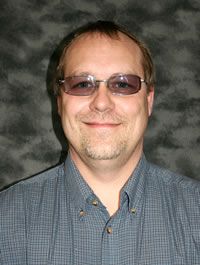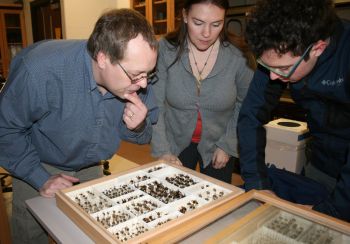
Robert Jean, Ph.D.
Surprisingly, after spending 14 years collecting more than 30,000 bees, Robert Jean, Ph.D., has only been stung four times. “Bees get a bad rap for stinging,” he said, adjusting his glasses with a smile, “but they care more about the wildflowers than you.”
Jean, the newest addition to Saint Mary-of-the-Woods College’s (SMWC) Department of Sciences and Mathematics, has a fascination with bees that is contagious. As one of a handful of scientists in the country specializing in bee species identification, he has crisscrossed the Midwest, hunting for bumblebees, non-native bees and even endangered species. Now, as SMWC’s new assistant professor of ecology, he will use his unmatched expertise to explore the mighty impact bees have on both local and national ecosystems.
“One in three bites of food is due to pollination by bees,” Jean said. “And we have 420 species in Indiana alone.” Jean’s personal collection of more than 1,000 samples has already created national buzz. “I get contacted by a lot of other researchers and government agencies to help identify their specimens,” he explained. In fact, a group from Earlham College recently traveled more than 300 miles to SMWC for Jean to identify specimens for their Joseph Moore Museum.
“Rob immediately recognized some rare species in our collections and some misidentifications,” said the museum’s director Heather Learner, Ph.D., assistant professor at Earlham College. “We are confident that his identifications will increase the value and utility of our collection.”

Robert Jean, Ph.D., assistant professor of ecology at SMWC, helped representatives from Earlham College in Richmond, Ind., identify several rare species in their museum’s collection.
By connecting with other colleges Jean hopes to increase his collection, facilitate the sharing of information and enhance cooperation with other entomologists. Conducting research at SMWC and in nearby nature preserves, such as Jackson-Schnyder and Wabashiki, he will create long-term data sets about bee populations. “The natural setting is key here,” he explained. “We have a spring wildflower display that is among the most incredible in the world.” His goal is to determine if the bees buzzing around these habitats are declining and, if so, to discover why. He believes that SMWC’s unique natural setting is the ideal place to start. “We have a nice mix of habitats here, which is great for working with bees,” Jean said.
Jean earned his master’s and doctorate in entomology at Indiana State University. Prior to coming to The Woods, he worked for the Saint Louis Zoo and the Missouri Department of Conservation. He has presented to the Ecological Society of America and led numerous bee identification workshops across the country. By working with Woods students and the community, he will enhance the information available to bee enthusiasts and the scientific community. “Insects are the largest organisms on the planet both in biomass and species,” Jean explained. “They are still the big unknown. It’s very exciting and we’re discovering new things everyday.”
